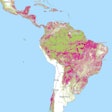WWF staff visit Panama's first FSC-certified natural forest along with the community enterprise that manages the concession. (Photo by Karen Mo, WWF)
Last week, we heard from my guest blogger, the director of WWF's Global Forest & Trade Network-North America, Linda Walker, on the natural advantages of wood and the opportunities presented by greater demand.
This week, Linda closes with the critical role of responsible forest management in rising to the challenge and meeting future demand for wood products within the planet's finite forest resources.
The Future with WoodThe future looks bright for responsible producers of wood products. Demand should continue to grow as emerging and developing nations use more wood to construct and furnish better houses and buildings, and wood should increasingly substitute for many alternative materials that are less sustainable, more energy-intensive and bring a heavier pollution load.
Better forestry, along with better technologies, governance, policies, and better information are all critical enablers of a forest products sector that contributes positively to the health of the planet and the 1.6 billion people who depend on forests for their livelihoods. It won't be easy, but there is no fundamental reason why we cannot set and achieve ambitious goals to stop deforestation while sustaining a vibrant wood products industry and meeting people's needs. Wood is renewable, recyclable, and biodegradable, so why not take advantage of this natural advantage?
Collaborating for Improved Forest ManagementWWF considers independent forest certification a vital tool in enabling buyers of wood products to seek assurances that the wood was legally harvested and came from a well-managed forest. Perhaps 30% of the world's production forest are certified, and around 13% of these forests are under FSC, which WWF considers the most credible forest certification system in use today. To have the greatest impact, certification will need to expand significantly, particularly in the Tropics (such as the Amazon, Borneo and Sumatra, and the Mekong River basin), where forests suffer most from destructive forestry, but also in temperate zones that suffer from high rates of illegal logging, such as the hardwood forests of the Russian Far East.
For this reason, WWF's Global Forest & Trade Network (GFTN) works with companies to help them identify and mitigate supply chain risk, and to progressively increase the amount of credibly certified wood in the supply chain over time. More than two-thirds of these companies are "trade participants" of GFTN: manufacturers, brokers, retailers and end users, both in producer countries and in importing countries such as those in North America and Europe. These participants span a wide range of products, including wood flooring, building products, furniture, paper, tissue and packaging.
The first FSC certified natural forest in the Darien region of Panama (photo by Lisa Dietz, WWF-US).
GFTN's step-wise approach provides a credible and transparent global framework for companies to set and achieve robust goals around responsible forest product sourcing. The United States is the world's largest consumer of industrial timber, pulp, and paper, and is one of the top importers of wood from places plagued by illegal logging and poor forest management. U.S. companies can thus be crucial allies in protecting forests worldwide. Read more about GFTN-North America and the program's 10 participants here. We also welcome stakeholders to join us in a visit to meet some of our international participants.
Want to Know More?Check out Chapter 4 of WWF's Living Forests Report on forests and wood products, or contact Linda Walker, and tell her you saw her on the HF Green Blog.
Interested in a Training Seminar on Illegal Logging?Check out these free seminars currently being offered by GFTN and TRAFFIC.
































